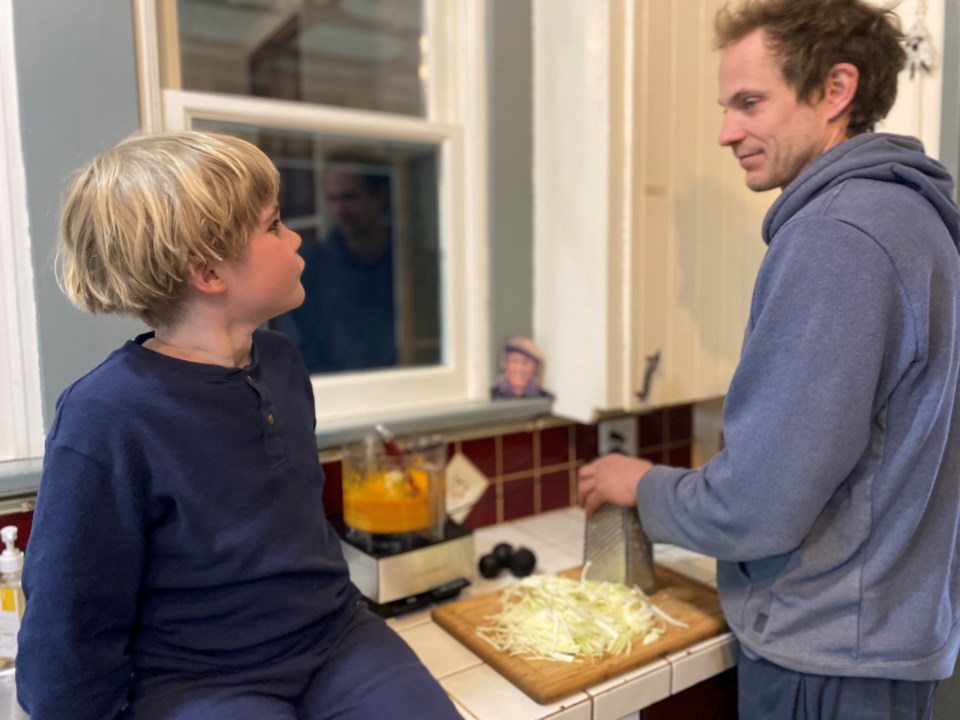If you’ve ever wandered in Sea to Sky forests, you might have heard someone call out, “Who-o-o, who-o-o, who cooks for yo-o-o-u-u?” in an owlish way. No, they’re not some kind of weirdo looking for kitchen help, or doing a quick survey, like I did. They’re a birder trying to elicit a response from barred owls.
The first time I heard that call I was hiking Black Tusk at dusk with a good friend who was also a very good birder. It cracked me up, and I’ve used it often since, but this is the first time in print—it felt right for a column about the kitchen scene, given the issues still swirling around women’s roles. I mean, we first started questioning all that back in Suffragettes’ time, never mind the ’60s.
Sadly, women are still widely under-represented in the public arena. Good to see gender parity on Whistler’s council, but only one third of our MPs in Ottawa are women. Female board members in the U.S. also constitute about a third; in Canada, it’s a pathetic 18 per cent.
In sports, there’s another twist. Terry O’Reilly, in his CBC Radio show Under the Influence, recently featured a New Zealand ad agency, DDB. When they were pitching FIFA Women’s World Cup, DDB found so many biases and errors they had to act. For instance, which boxer has defended their title the most? The internet says Joe Louis, with 27 matches. But it’s really Regina Halmich, with 45. So DDB created a website, Correct the Internet for doing just that—correcting gender-based biases toward men, and making women more visible in sports whenever they get the short end of the stick online.
On the local kitchen scene, I’ve been wondering how it’s going in a place as seemingly progressive as Whistler. Are women still doing most of the traditional cooking? Or have we corrected that gender bias, too?
I know it’s not scientific, but last week I did a straw poll, emailing 58 people—half men, half women—connected to Whistler, around the question “who cooks for you?” Here’s what I learned.
First, it was pretty interesting who responded. Of all the replies I received, only one was from a man! What’s that about!? Maybe because he cooks 80 per cent of dinners?
Otherwise, based on my all-female cohort of respondents, there’s no doubt women are still doing most of the cooking.
Sure, there are variations around meal planning, grocery shopping and the actual cooking, and many men clean up. There were also quite a few 50/50 or 60/40 splits, especially in younger households, plus some pretty funny stories and circumstances. (“Our general approach is, if the food used to move independently, he is responsible for it. If it never moved independently, she is responsible for it—except for pancakes.”)
But bottom line: the majority of respondents may not be barefoot and pregnant, but they’re still in the kitchen way more than men—even when they work full-time. And a surprising number cook nearly every meal.
“Ray and Pauline are old school... mostly because the kitchen is Pauline’s comfort zone …,” writes Pauline Wiebe, who does 95 per cent of the cooking. “I always say, if you like doing something, then do it. I love cooking, so I do it. And, there are always two choices for dinner: take it or leave it.”
Joan Richoz is also a 90-per-center. “Marcel only cooks when he has an audience!! Like raclette, fondue,” she writes, adding a real Marcel story: When he tried cooking a spicy pasta dish, to give Joan a break, he had no idea how much heat to add. “Our poor friend was crying, the food was so spicy! This eventually turned into a signature dish called, ‘Come on baby light my fire!’”
There were also some cool role reversals, like this one: “Our household has been “non-traditional” for years! My husband does most of the shopping, laundry and cooking at home,” writes Isabel Chung, former head chef at Whistler’s Fairmont Chateau, now at the Fairmont Orchid on Hawaii’s Kohala coast. “Truth is I could not be as successful as I have been without his support … He is a great cook, and was a Red Seal chef long before me.”
Stella Harvey, a novelist who started the Whistler Writers Festival, is the first to admit cooking is not in her genes, but she and hubby Dave have figured out a 50/50 split “because we’ve come to understand our individual strengths.
“When I tell [people] that Dave does all the cooking, he perks up (typically a man of few words), and says, ‘I’d starve if I didn’t cook,’” she writes. “That is likely very true. My idea of cooking is making good use of my cellphone, to call for delivery. Just saying.”
Sure, we’ve come a long way from the days when a man “did not even make his own cup of instant coffee.” But we’ve got a long way to go. So I was heartened that several respondents said their boys—and girls—are learning to cook. A few young men who graduated in Whistler in 2002 have even become professional chefs. And kids as young as five are at home in the kitchen.
At Plenty Wild organic farms in Pemberton, David Tanner has been cooking the lion’s share for years, but lately he and his partner Alyssa Belter have landed on a true 50/50 system. They note two things: At farmers’ markets, it’s roughly 25-per-cent men, 65-per-cent women, and 10-per-cent couples. And Felix, their five-year-old, is very happy in the kitchen, doing age-appropriate things (no knives!). “He likes to pretend he has a restaurant,” says Alyssa.
As for those barred owls, if you’re ever lucky enough to have one answer your call, be respectful, as with any wildlife. Keep your distance. And never feed it, despite asking who cooks for it.
Glenda Bartosh is an award-winning journalist who thanks Claire Ruddy at AWARE for her story idea about how solo dwellers handle meals.




